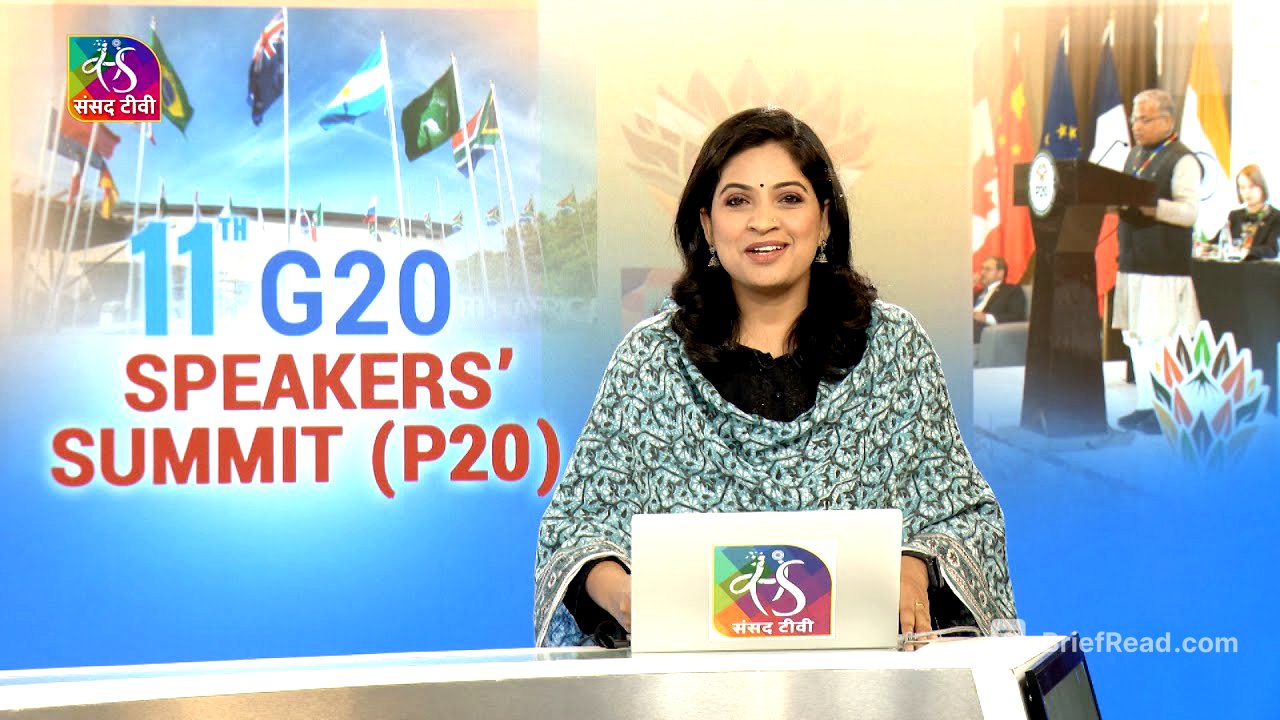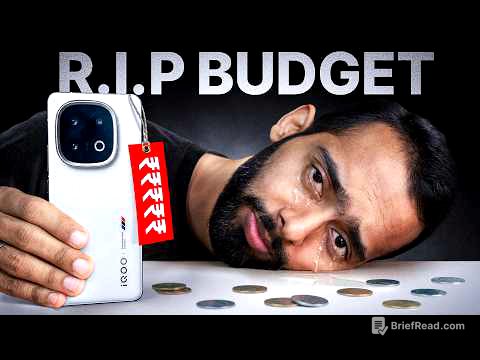TLDR;
This episode of Sansad TV's "Perspective" discusses the critical need for equitable climate finance to achieve a just and inclusive energy transition, particularly in developing countries like those in Africa. It highlights discussions from the 11th G20 Parliamentary Speaker Summit (P20) in Cape Town, emphasizing the importance of balancing energy security, climate action, and economic growth with equity and sustainability.
- The episode addresses the challenges in securing clean, affordable, and reliable energy in developing nations.
- It explores how equitable climate finance can drive a just and inclusive energy transition.
- Experts discuss innovative financial mechanisms and the role of parliaments in ensuring transparent allocation of climate funds.
- The conversation also covers India's potential leadership in bridging the gap between climate ambition and climate justice, drawing from its G20 presidency and experiences in renewable energy expansion and rural electrification.
Introduction: The Imperative of Equitable Energy Transition [0:14]
Tina Ja introduces the topic of equitable access to energy as a fundamental human right and a prerequisite for sustainable development, especially in developing countries and Africa. Despite Africa's renewable energy potential, it receives a small share of global energy investments, highlighting the need for equitable financial flows. The 11th G20 Parliamentary Speaker Summit (P20) in Cape Town focused on balancing energy security, climate action, and economic growth with equity and climate justice. The discussion will explore key takeaways from the P20 and how equitable climate finance can drive a just and inclusive energy transition. Ulka Kelkar and Chandra Bhushan are introduced as guests.
Progress Since India's G20 Presidency [2:46]
Chandra Bhushan assesses the progress since India's G20 presidency, noting that while India addressed a wide range of important issues, the situation has not been optimistic due to some developed countries backtracking on their commitments. The US withdrawal from the Paris Agreement and a dampening of ambition from Europe are causes for concern. Equitable climate finance is crucial for Africa due to the high cost of capital, with interest rates for solar panel projects reaching 20% annually, compared to much lower rates in India and Europe. Despite contributing the least to climate change, African nations pay a high price for adaptation and energy transition. Renewable energy investment is growing due to its increasing competitiveness, but equitable finance remains vital for large-scale investment in African countries.
Barriers to a Just and Inclusive Energy Transition [6:29]
Ulka Kelkar identifies two key barriers to a just and inclusive energy transition. First, the huge amount of money required, currently largely from public funds, needs to be supplemented by private sector investment. However, the private sector seeks profit, and sectors like distributed renewable energy, micro, small, and medium enterprises, and renewables in agriculture and water are not seen as profitable enough. Leveraging private finance through public funds and reducing risk perception is essential. Second, the transition must focus on jobs, livelihoods, and access to skilling and finance for youth, women, and small businesses. Philanthropic funding and development aid, which has been cut back, should be directed towards climate-friendly activities to create economic opportunities alongside emission reductions.
Innovative Financial Mechanisms for Climate Action [10:13]
Ulka Kelkar discusses innovative mechanisms to mobilize large-scale funds for climate action. One approach is to raise additional resources through levies on luxury goods and services like business class travel, international shipping, or internet use. Another is to mainstream existing funding towards climate action, ensuring that new infrastructure projects in developing countries prioritize non-fossil-based and decentralized energy solutions. Additionally, local funds, such as those from district mineral foundations and construction projects, can support the livelihoods of those affected by energy transitions through skilling and compensation. Blended finance instruments, combining public finance with private capital, can be effective if governments provide guarantees against regulatory and contractual risks.
Reforming the Global Financial Architecture [13:24]
Chandra Bhushan critiques the global financial system, highlighting that countries most vulnerable to climate change often receive the worst sovereign ratings, leading to higher costs of capital. The current risk and reward framework is problematic in a rapidly changing climate. He emphasizes the need to reform the global financial system to make it fairer, as developed countries are unlikely to provide sufficient public funds to developing countries. The focus should be on demanding serious reform in the global financial system to address this fundamental issue.
Ensuring a People-Centric Energy Transition [14:22]
Ulka Kelkar emphasizes the importance of ensuring that the energy transition benefits both the climate and people, while also protecting natural resources. Learning from examples like the shutting down of the Komai power plant in South Africa can provide valuable insights. In India, states like Chhattisgarh, Odisha, and West Bengal, along with public sector utilities, are studying and implementing best practices to prepare for the transition. Reskilling and accommodating workers in different parts of the value chain, supported by government skilling agencies, large companies, and corporate social responsibility initiatives, are crucial for a just transition.
India's Role in Promoting Equity and Sharing Best Practices [17:23]
Chandra Bhushan discusses how climate finance can be used to reduce emissions, protect jobs, promote equity, gender inclusion, and local empowerment. He reiterates the need for fairness in the global financial system, noting that vulnerable countries pay higher costs of capital due to the current risk and reward system. Reforming the global financial system is a key agenda for developing countries. While best practices are still emerging at the national level, developing countries must find their own way. Mainstreaming gender and focusing on STEM education are important for gender inclusion.
Strengthening Parliamentary Oversight and Transparent Allocation of Funds [21:17]
Ulka Kelkar outlines how parliamentarians can play a role in ensuring a just and equitable transition. This includes creating comprehensive plans for their constituencies, utilizing discretionary funding to promote initiatives like rooftop solar, raising questions in parliament, setting standards to signal long-term government support for clean energy, and de-risking investments to combat high capital costs. The finance commission process can incentivize states to invest in clean energy and climate adaptation.
India's Leadership Role and Bridging the Gap [24:22]
Chandra Bhushan highlights India's experience as valuable for developing countries in terms of governance and technology. Standards set by the Bureau of Indian Standards (BIS) are adopted by many developing countries. India's experience in renewable energy, both distributed and large-scale, is crucial. He emphasizes the need to share experiences, standards, and financial systems with other developing countries. India needs a climate change law and greater investment in adaptation funding and resilience.
Conclusion: Collective Action for a Just Transition [27:29]
The conversation concludes by emphasizing that the challenge is not just mobilizing finance but ensuring it flows where it is needed most, enabling a transition that is green, just, inclusive, and fair. Collective action is required to reflect the outcomes of the P20 and achieve a truly equitable energy transition.









